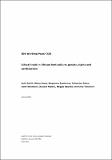| dc.contributor.author | Smith, Sally | |
| dc.contributor.author | Auret, Diana | |
| dc.contributor.author | Barrientos, Stephanie | |
| dc.contributor.author | Dolan, Catherine | |
| dc.contributor.author | Kleinbooi, Karin | |
| dc.contributor.author | Njobvu, Chosani | |
| dc.contributor.author | Opondo, Maggie | |
| dc.contributor.author | Tallontire, Anne | |
| dc.coverage.spatial | South Africa | en_GB |
| dc.coverage.spatial | Kenya | en_GB |
| dc.coverage.spatial | Zambia | en_GB |
| dc.date.accessioned | 2014-06-10T16:16:33Z | |
| dc.date.available | 2014-06-10T16:16:33Z | |
| dc.date.issued | 2004 | |
| dc.identifier.citation | Smith, S., D. Auret, S. Barrientos, C. Dolan, K. Kleinbooi, C. Njobvu, M. Opondo & A. Tallontire (2004) Ethical trade in African horticulture : gender, rights and participation. Working paper series, 223. Brighton: IDS. | en_GB |
| dc.identifier.uri | https://opendocs.ids.ac.uk/opendocs/handle/20.500.12413/4018 | |
| dc.description.abstract | Codes of conduct covering employment conditions of southern producers have gained popularity over the
past decade. In African horticulture employers now face a plethora of codes coming from supermarkets,
importers, exporters and trade associations. Women constitute the majority of workers in African export
horticulture. However, men are often in permanent employment, whereas women tend to work in
temporary and insecure jobs. This report provides an in-depth assessment of gender and ethical trade in
South African fruit, Kenyan flowers and Zambian flowers and vegetables. It examines the gendered needs
and rights of workers, as articulated by workers themselves, and how these could best be addressed by
codes of conduct. The research paid particular attention to vulnerable groups such as women and
seasonal, casual and migrant workers, who typically face a different set of constraints and opportunities in
employment. This paper discusses the nature of employment and working conditions found in the subsectors,
and the varying perspectives of workers and employers toward these conditions. It summarises
key gender issues in employment and outlines how they relate to codes. It explores the benefits of
“participatory social auditing” for assessing workplace issues, especially gender issues. It describes the
value of a local multi-stakeholder approach to code implementation and the extent to which stakeholders
in South Africa, Kenya and Zambia have embraced the process thus far. Finally it identifies policy
recommendations for best practice in code implementation. | en_GB |
| dc.language.iso | en | en_GB |
| dc.publisher | IDS | en_GB |
| dc.relation.ispartofseries | IDS working papers;223 | |
| dc.rights.uri | http://www.ids.ac.uk/files/dmfile/IDSOpenDocsStandardTermsOfUse.pdf | en_GB |
| dc.subject | Agriculture | en_GB |
| dc.subject | Gender | en_GB |
| dc.subject | Migration | en_GB |
| dc.subject | Rights | en_GB |
| dc.subject | Trade | en_GB |
| dc.subject | Work and Labour | en_GB |
| dc.title | Ethical trade in African horticulture : gender, rights and participation | en_GB |
| dc.type | IDS Working Paper | en_GB |
| dc.rights.holder | Institute of Development Studies | en_GB |
| dc.identifier.koha | 147892 | |

